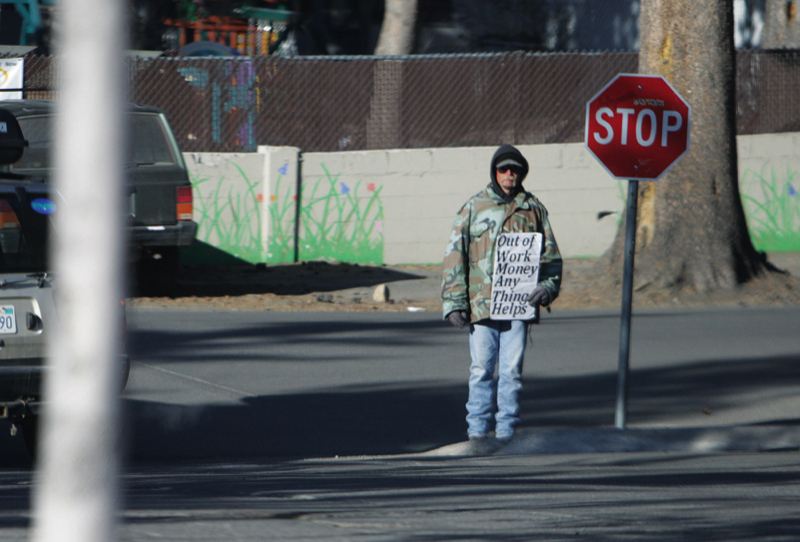Left in the Cold:
Homeless death raises concern for lack of shelters

PUBLISHED: DECEMBER 14, 2011
By Jason Shueh
Tahoe Daily Tribune
By Jason Shueh
Tahoe Daily Tribune
TRUCKEE — The death of a homeless man in Truckee last month, likely due to climate exposure, is heightening the need for an emergency shelter in a region known for its harsh winter conditions.
According to Nevada County Chief Deputy Coroner Paul Schmidt, on Nov. 14 transient Jeffrey Beals, known to frequent Washington but living temporarily in Truckee, was found dead at 8:54 a.m. near a bench located near the Deerfield Drive Post Office. Though an autopsy for cause of death has yet to be released, authorities said cold temperatures could have been the significant factor.
Stephanie Blume, Truckee director for Project MANA, said that death or serious injury to the homeless population from harsh winter weather has become typical for the area.
“It happens every winter. We get clients who die from the cold because we don't have an emergency shelter,” said Blume.
Blume said Beals' death underscores the desperate need for a homeless shelter in the Truckee-Tahoe area as shelters in Reno and Sacramento already have long waiting lists.Beals was a recent regular at Truckee's Project MANA and known to Blume, who said he suffered from serious medical problems but was harmless and nice to those with whom he associated.
According to another transient client who said he was with Beals the night before he died, Blume said the client and Beals had taken shelter at the post office but were later asked to leave by law enforcement. Blume said according to the client, Beals had remained behind, declining to accompany his friend to the nearby Fellowship Church.
Loren Morrill, pastor of the Fellowship Church — known for its homeless services — said Beals had come earlier that day to have one of his jackets cleaned and in fact was expected to return later that night.
“It was a real cold night. It snowed. He came down before the (church's) Thursday night dinner, left his jacket to wash, did not come back, got drunk and died,” said Morrill.
Morrill described Beals as “a nice guy” and “a real sweetheart” who would drop by the church from time to time but did not come a lot because he would guard the homeless camps while the other transients came to dinner. Beals would wait for them to bring food back on their return.
Like Blume, Morrill said there is a desperate need for a shelter in town during the winter season, because while his church and other homeless resources can offer some food and temporary shelter during their services, they cannot offer all-night lodging as it requires staffing to prevent thefts, vandalism, littering, defecation and potential violence problems.
Despite the resources required, Blume said a shelter's life-saving qualities far outweighed the difficulties.“(With Beals) it was one of those situations where if we had overnight shelters we would have put him there,” she said.
Current efforts of locating funding for a homeless shelter have been difficult for many of Truckee's outreach groups.Blume said Project MANA has been working in collaboration with the town's Homeless Coalition, The Community Collaborative of Truckee and other groups, yet town zoning laws and neighborhood approvals have created barriers and prolonged delays.
Truckee Police Capt. Randy Fenn said local law enforcement also struggles with limited resources, and they are only able to intervene when a criminal incident has occurred.
“We look at this like we do most problems, from a public safety standpoint,” said Fenn. “We respond to calls when we have them … and we try to mitigate it at the lowest level and that's to get them to move on.
”During the summers when the homeless population is the highest, Fenn said the biggest problem is with fire danger from the homeless camps, typically hidden in the woods with unregulated fires.
But in the winter, Fenn said direct resources from law enforcement are limited in regards to shelter, and being homeless is not illegal in itself.“We certainly don't want to discriminate against people just because they don't have a home,” Fenn said.
Blume said the homeless population Truckee's Project MANA typically ranges from 15 to 30 transients, and Morrill said his church serves a range of roughly six to eight a week. Yet Allison Schwedner, director of the Community Collaborative of Truckee, said according to the bi-annual Housing and Urban Development homelessness count reported in January 2010, there are more than 60 individual transients within Truckee and the surrounding area.
“From the Collaborative's perspective, we recognize it as a growing concern in our community,” said Schwedner.
Blume said the demographics of the local homeless population are changing as well. In the past Blume said they could be categorized by long-term and short-term transients and by their distance from town — typically the elderly stayed close to town while healthier transients made camps hidden elsewhere.
Now, however, Blume said that is all changing.“We're seeing a lot more clients homeless in vehicles, college graduates, they're not your typical stereotype of what you think homeless people are,” Blume said.
While a potential shelter awaits funding and more organizational development — no single entity has taken full charge of a formal shelter campaign — there are some successes despite the limited resources.
Morrill said his church has had a few success stories with their programs designed to help those with chemical dependencies through religious and non-religious education. And sometimes funding is available for bus tickets to get those who are trapped in the weather to warmer climates.
In his experience, Morrill said alcohol is to blame for much of the chemical dependency in the homeless and is also a contributing reason for their continued homelessness.
“We make it a point not to give them money,” Morrill said, adding that they focus on providing food, travel fare, church services and mechanical work for those who have vehicles.
According to Nevada County Chief Deputy Coroner Paul Schmidt, on Nov. 14 transient Jeffrey Beals, known to frequent Washington but living temporarily in Truckee, was found dead at 8:54 a.m. near a bench located near the Deerfield Drive Post Office. Though an autopsy for cause of death has yet to be released, authorities said cold temperatures could have been the significant factor.
Stephanie Blume, Truckee director for Project MANA, said that death or serious injury to the homeless population from harsh winter weather has become typical for the area.
“It happens every winter. We get clients who die from the cold because we don't have an emergency shelter,” said Blume.
Blume said Beals' death underscores the desperate need for a homeless shelter in the Truckee-Tahoe area as shelters in Reno and Sacramento already have long waiting lists.Beals was a recent regular at Truckee's Project MANA and known to Blume, who said he suffered from serious medical problems but was harmless and nice to those with whom he associated.
According to another transient client who said he was with Beals the night before he died, Blume said the client and Beals had taken shelter at the post office but were later asked to leave by law enforcement. Blume said according to the client, Beals had remained behind, declining to accompany his friend to the nearby Fellowship Church.
Loren Morrill, pastor of the Fellowship Church — known for its homeless services — said Beals had come earlier that day to have one of his jackets cleaned and in fact was expected to return later that night.
“It was a real cold night. It snowed. He came down before the (church's) Thursday night dinner, left his jacket to wash, did not come back, got drunk and died,” said Morrill.
Morrill described Beals as “a nice guy” and “a real sweetheart” who would drop by the church from time to time but did not come a lot because he would guard the homeless camps while the other transients came to dinner. Beals would wait for them to bring food back on their return.
Like Blume, Morrill said there is a desperate need for a shelter in town during the winter season, because while his church and other homeless resources can offer some food and temporary shelter during their services, they cannot offer all-night lodging as it requires staffing to prevent thefts, vandalism, littering, defecation and potential violence problems.
Despite the resources required, Blume said a shelter's life-saving qualities far outweighed the difficulties.“(With Beals) it was one of those situations where if we had overnight shelters we would have put him there,” she said.
Current efforts of locating funding for a homeless shelter have been difficult for many of Truckee's outreach groups.Blume said Project MANA has been working in collaboration with the town's Homeless Coalition, The Community Collaborative of Truckee and other groups, yet town zoning laws and neighborhood approvals have created barriers and prolonged delays.
Truckee Police Capt. Randy Fenn said local law enforcement also struggles with limited resources, and they are only able to intervene when a criminal incident has occurred.
“We look at this like we do most problems, from a public safety standpoint,” said Fenn. “We respond to calls when we have them … and we try to mitigate it at the lowest level and that's to get them to move on.
”During the summers when the homeless population is the highest, Fenn said the biggest problem is with fire danger from the homeless camps, typically hidden in the woods with unregulated fires.
But in the winter, Fenn said direct resources from law enforcement are limited in regards to shelter, and being homeless is not illegal in itself.“We certainly don't want to discriminate against people just because they don't have a home,” Fenn said.
Blume said the homeless population Truckee's Project MANA typically ranges from 15 to 30 transients, and Morrill said his church serves a range of roughly six to eight a week. Yet Allison Schwedner, director of the Community Collaborative of Truckee, said according to the bi-annual Housing and Urban Development homelessness count reported in January 2010, there are more than 60 individual transients within Truckee and the surrounding area.
“From the Collaborative's perspective, we recognize it as a growing concern in our community,” said Schwedner.
Blume said the demographics of the local homeless population are changing as well. In the past Blume said they could be categorized by long-term and short-term transients and by their distance from town — typically the elderly stayed close to town while healthier transients made camps hidden elsewhere.
Now, however, Blume said that is all changing.“We're seeing a lot more clients homeless in vehicles, college graduates, they're not your typical stereotype of what you think homeless people are,” Blume said.
While a potential shelter awaits funding and more organizational development — no single entity has taken full charge of a formal shelter campaign — there are some successes despite the limited resources.
Morrill said his church has had a few success stories with their programs designed to help those with chemical dependencies through religious and non-religious education. And sometimes funding is available for bus tickets to get those who are trapped in the weather to warmer climates.
In his experience, Morrill said alcohol is to blame for much of the chemical dependency in the homeless and is also a contributing reason for their continued homelessness.
“We make it a point not to give them money,” Morrill said, adding that they focus on providing food, travel fare, church services and mechanical work for those who have vehicles.
© Swift Communications, Inc.
We look at this like we do most problems, from a public safety standpoint. We respond to calls when we have them … and we try to mitigate it at the lowest level, and that's to get them to move on.
Truckee Police Capt. Randy Fenn
